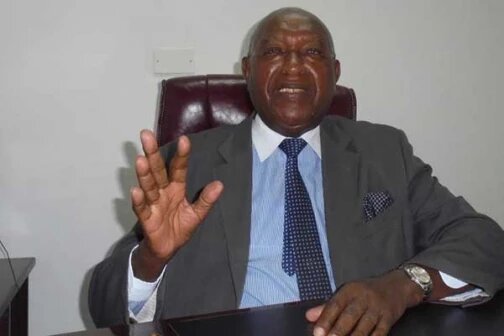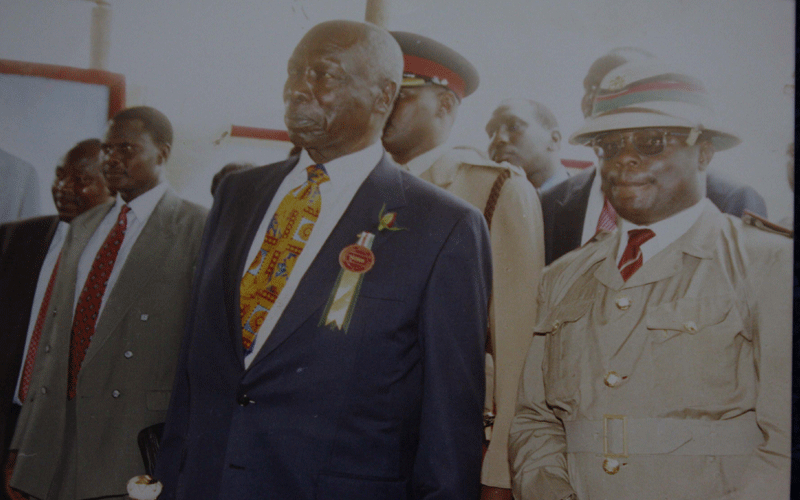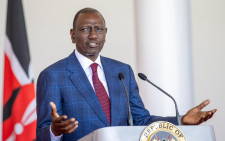Titus Mbathi: The day I fell out with Moi

Former Labour Minister Titus Mbathi recently celebrated his 94th birthday a peaceful, contented and satisfied shujaa (hero) as he launched his autobiography, My Life’s Journey.
The former Permanent Secretary in the first Cabinet of President Mzee Jomo Kenyatta, after independence in 1963, was in his element as he responded candidly to questions by his publisher about his illustrious career in both public and private service.
Mbathi plunged into politics in 1974 and was elected MP for Kitui Central before President Daniel Moi appointed him Labour Minister.
Unchartered waters
“What I had not bargained for was the dirty side of politics. They spread rumours that my American wife regarded women as dirty. They also spread rumours that I was so detribalised that I could hardly address a meeting in Kikamba, our local language!” the former Cabinet Minister recalls.
It was not smooth sailing for Mbathi in the murky waters of politics as he fell out of favour with President Moi for accepting calls by Kamba leaders to vie for the chairmanship of Kamba MPs Caucus against Moi’s favourite, Mulu Mutisya, who was a nominated MP.
But the straw that broke the camel’s back was when Moi announced at the wedding of a son of Army General Jackson Mulinge, who was Chief of General Staff, and a prominent Kamba leader, that he had banned Civil Servants Union and the University Staff Union for working against his government. The minister later asked his boss after a Cabinet meeting at Nairobi State House to reconsider the decision because of the protocols signed with International Labour Organisation (ILO) among others.
“The President’s reply shocked me. He told me that as a sovereign State, we could do whatever we wanted, then looked at me straight in the eye and asked me whether I was the same person who he had appointed as Minister. It was then clear to me that my goose was cooked and that my days as Minister were numbered. Since then, his attitude towards me changed and he was openly hostile,” Mbathi.
Humble beginnings
He has fond memory of his humble beginnings in Kisekini village in present day Kitui County in Eastern region, where his father, Benjamin Mbathi, was one of the first to embrace Christianity and western education and later rose to be a pioneer chief District Commissioner’s clerk in early 1900s.
The former Member of Parliament for Kitui Central (1978-1983), was the seventh born out of 13 siblings: As his father’s siblings had died as babies, his parents named him Mbathi, which means one set apart in the hope that he would survive.
Like his parents had predicted, the former Chairman of Kenya Electricity Generating Company (KenGen) survived in the village as a herdsboy, hunter with his father, primary school student at Mulango Elementary and Kitui Primary School in Kitui, and secondary school at Mangu High, in Kiambu District, before he won a scholarship to proceed for further studies in India and then later to the United States of America for his Master’s degree.
At Mangu High School, previously called Holy Ghost College, his former classmates from Kitui were Samuel Mwinzi and Kyalo Mutinda while others from other parts of the country were Tom Mboya, who later rose to be Kanu Secretary-General and Cabinet Minister; Moody Awori (former Vice President and Funyula MP), Lawrence Sagini (former Cabinet Minister and Kanu Kisii chairman), Samuel Waruhiu (became a prominent lawyer) and John Njenga (who was later ordained Catholic Bishop) among others.
“Strangely enough, we were never permitted to wear shoes at school, not even during the cold months of July and August. We resented this rule which we felt was a reflection of the colonial policy of keeping ‘Africans in their place!” Mbathi recalls.
However, not everything was perfect, he recalls saying that Mangu was an outstanding academic institution, but in terms of leadership development, it left a lot to be desired as students had no avenue for ventilating their grievances. School assemblies that would have served that purpose was used by the principal to insult the students and tell them how backward Africans were!
The tirades became more pronounced after the release and return of Jomo Kenyatta and his colleagues from detention, whom the principal regarded as a communist, ungodly, and unfit to lead the country.
“We had a burning desire to transform our community. With colleagues from Alliance High School, we formed Kitui Reformers Association with Kyalo Mwendwa as chairman and I as secretary,” says Mbathi.













